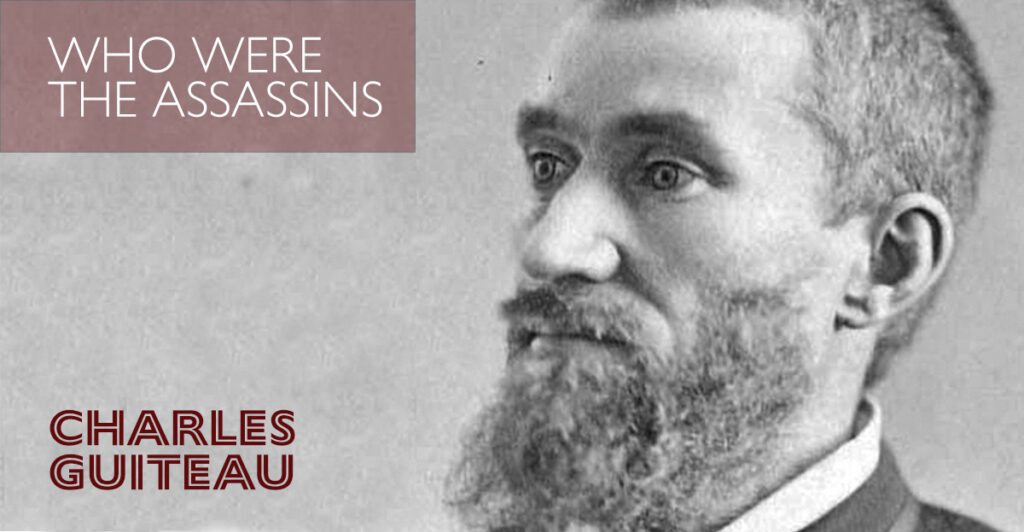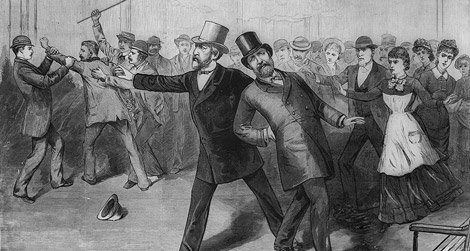
Another Assassin from Assassins
The characters in Stephen Sondheim’s musical are drawn from American history. Many are memorable names and figures, but some may be surprisingly un-familiar. We continue our journey through the historical characters from Assassins as we are preparing our upcoming production.
Charles Guiteau
Assassinated President James A. Garfield
Charles Guiteau was a deeply troubled and strange man who killed President James A. Garfield in 1881.
Guiteau was a social outcast who failed out of jobs, schools, and even sex cults. He lived in the Utopian “Oneida Community” and was a deep admirer of its founder, John Humphrey Noyes, who espoused a belief in group marriages. But Guiteau wasn’t deemed fit for even the freest love, and was soon nicknamed “Charles Gitout” by community members put off by his ravings and upsetting demeanor.
Guiteau drifted through a pitiful career as a lawyer, a failed marriage, and a plagiarized attempt at starting his own cult in the ensuing years, alienating himself from the world while become more and more convinced of his own genius and righteousness.
In 1880, Guiteau wrote a political speech in support of James A. Garfield for president, which was distributed to members of the Republican National Committee, and delivered publicly only twice. He convinced himself that his contribution to the campaign was vital in securing Garfield’s victory, and demanded a consulship in return. His demands were ignored by members of Garfield’s administration, which filled Guiteau with rage.

On July 2nd, 1881, Guiteau lied in wait for President Garfield at a train station, and shot him twice in the back. Though the president’s wounds would have been considered quite treatable by today’s standards, sterilized medical operations would not become the norm in America until several years later. Garfield died 11 weeks after the attack.
Guiteau’s trial became a media curiosity as he argued with his defense, made strange outbursts, and defended himself with original poetry. Before he was executed by hanging, he recited an original poem titled “I Am Going To The Lordy”.
After Guiteau’s death, his body and brain became objects of fascination in the medical community. Abnormally thick dura matter in the brain seemed to indicate that he suffered from neurosyphilis, which some believed to explain Guiteau’s deteriorating relationship with reality in the later years of his life.
For further reading/listening:
- “The Last Chapter in The Life of Guiteau” – Wikisource – includes the text of the poem “I am going to the Lordy” (featured in the show), which Guiteau composed and recited immediately before his execution.
- “A President felled by an Assassin and 1800s Medical Care” – The New York Times
- An Assassin in Utopia: The True Story of a Nineteenth-Century Sex Cult and a President’s Murder by Susan Wels – A true-crime book that weaves together two astonishing tales from American History.
Meet our Guiteau – Phineas Wilder

Phineas portrays Charles Guiteau in his first show with Landmark. A graduate of Sarah Lawrence College, he also attended the British American Drama Academy in London. Past shows include The Drowsy Chaperone (Underling), Best and Only (Jud), and Preludes From Moonlight (Richard).
💡 Phineas also penned this hilarious article about Assassins for Broadway Beat: Oops: Local Man Typed “Assassins” Lyrics Into Google and Now He’s On an FBI Watchlist
